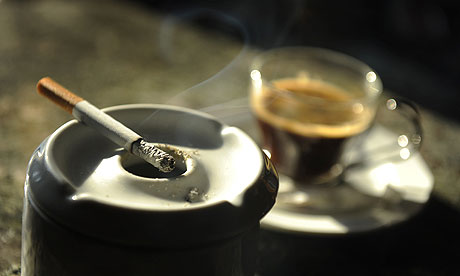
Jon56 asks:
How did the English smoking ban become law? In particular, it forbids a group of adults from buying or renting an isolated building, currently a cafe, and setting up a smoking cafe, staffed by members of the group on a voluntary basis. Surely such a ban, interfering with an activity which would be legal in the home of one of the participants, contravenes the European Human Rights Act?
The smoking ban in England and Wales was introduced by the Health Act 2006. It operates by creating "smoke-free premises" in which it is an offence to smoke and the person in charge of the premises commits an offence if he or she fails to take reasonable steps to stop someone from smoking there:
• Premises that are open to the public (ie the public has access to them, whether by invitation or not, and whether for payment or not) are smoke-free when they are open to the public.
• Premises used as a place of work (including voluntary work) by more than one person, or where members of the public might attend for the purpose of seeking or receiving goods or services from someone working there (even if members of the public are not always present), are smoke-free all the time.
• Premises are smoke-free only in areas which are enclosed or "substantially enclosed".
The smoke-free (exemption and vehicles) regulations 2007 create certain exemptions including for private dwellings, designated bedrooms in hotels and clubs, designated rooms in care homes, hospices and prisons, and performers "where the artistic integrity of a performance makes it appropriate for a person who is taking part in that performance to smoke". Regulation 10 created a temporary exemption for designated rooms in residential mental health institutions.
Jon56 is right, then, that the law does not allow for smoking cafes, even if they are staffed on a voluntary basis, because they would be both open to the public and used as a place of work by more than one person. The rationale for the ban was to protect the public and workers from the negative health effects of second-hand smoke, but presumably it was thought that this aim could only be effectively achieved if there was no distinction between voluntary and paid workers, just as there is none between members of the public who mind being in a smoking environment and those who don't.
Article 8 of the European convention on human rights contains a right to respect for private life, any interferences with which must be justified as necessary and proportionate to achieve one of the permitted aims (including protecting health and the rights of others). The boundaries of the concept of private life are not very easily defined, but it is doubtful that article 8 would be engaged in the situation jon56 describes. The courts have said that the purpose of the right is to protect the individual against intrusion by agents of the state, unless for good reason, into the private sphere within which individuals expect to be left alone to conduct their personal affairs and live their personal lives as they choose. Running a cafe which is open to the public would almost certainly not be considered to be part of personal life protected by article 8. Indeed, in a recent case the court of appeal suggested that even a ban on smoking in the home might not engage article 8.
The case concerned the ban on smoking in Rampton, one of the three high-security psychiatric hospitals in England and Wales. Notwithstanding the temporary exemption in the 2007 regulations referred to above, Nottinghamshire healthcare NHS trust had a smoke-free policy under which smoking was prohibited, subject to very limited exceptions, for both and staff and patients throughout all trust premises – whether indoors or outdoors. The basis for the ban on smoking outdoors was that security reasons prevented the trust from permitting patients to smoke outside. Some patients argued that the ban was incompatible with their rights under article 8 because Rampton was effectively their home. They also argued that because prisoners had a permanent exemption under the 2007 regulations, which allowed them to smoke in a designated room, as opposed to the temporary exemption given to mental-health patients, the law discriminated against them contrary to article 14 of the convention.
The trust accepted that Rampton was the appellants' home because they were detained there and had nowhere else to conduct their personal affairs or develop as human beings. The average length of stay was eight years. Despite this the court found by a majority that article 8 was not engaged by a total ban on smoking. This was in part because of the nature of detention in a secure hospital – it is a public not a private place where patients do not enjoy real autonomy (for example, they cannot choose what they eat or drink) – but also because the majority considered that the activity of smoking was not sufficiently important to personal identity or physical or moral integrity to warrant protection under article 8. As article 14 only prohibits discrimination as regards the application of other convention rights, the majority concluded that it did not apply either. Even if it had, it would have found it was legitimate to treat mental-health patients differently from prisoners because of the particular focus on healthcare in secure hospitals.
lord justice Keene disagreed. In his view article 8 was broad enough to encompass the right to smoke. He noted that for some people it is "a pastime greatly valued", that some writers and journalists cannot write without smoking, and that others seem to obtain great personal pleasure from smoking after eating "or other activities". He preferred a more expansive interpretation of article 8 – one where it might also be engaged if the government were to prohibit the playing of chess or bridge or listening to music in private. For any West Wing geeks out there, he preferred the Bartlet approach over that of prospective supreme court justice, Harrison, who believed he would have no constitutional basis to strike down a law which banned the use of cream in coffee.
In Keene's view the total ban on smoking was more than was necessary to accomplish the public heath objective of protecting people from second-hand smoke, and therefore breached article 8. He also considered that there was no justification for treating mental-health patients differently to prisoners and therefore the law was discriminatory in breach of article 14.
It is possible that the majority would have found that article 8 was engaged if the case had concerned a ban on smoking in private dwellings, but even then any interference is capable of being justified on grounds of the protection of health so the result might well have been the same.
In light of all of that, I'm afraid jon56 will have to pursue political rather than legal avenues if he wants to open a smoking cafe in this country.
• Do you have a question for the Liberty Clinic? Post it here


Smoking bans are prohibitions on individual behavior. They are about blaming the victims.
ReplyDeleteThey are patently distractions, wrapped as if about "clean air" and "worker health", from any actions that would instead create prohibitions on (and criminal charges against) the corporate behavior of contaminating typical cigarettes (so-called "tobacco") with some of the most deadly industrial substances on earth...pesticide residues galore, dioxin-forming chlorine pesticides and chlorine-bleached paper, radiation from certain fertilizers, not to mention added burn accelerants, kid-attracting sweets and flavors, addiction-enhancing additives, and even fake tobacco.
Once both sides agree that it's just tobacco, and not about Pesticide Pegs, Dioxin Dowels, or Radiation Rods...there can be no legitimate discussion or resolution.